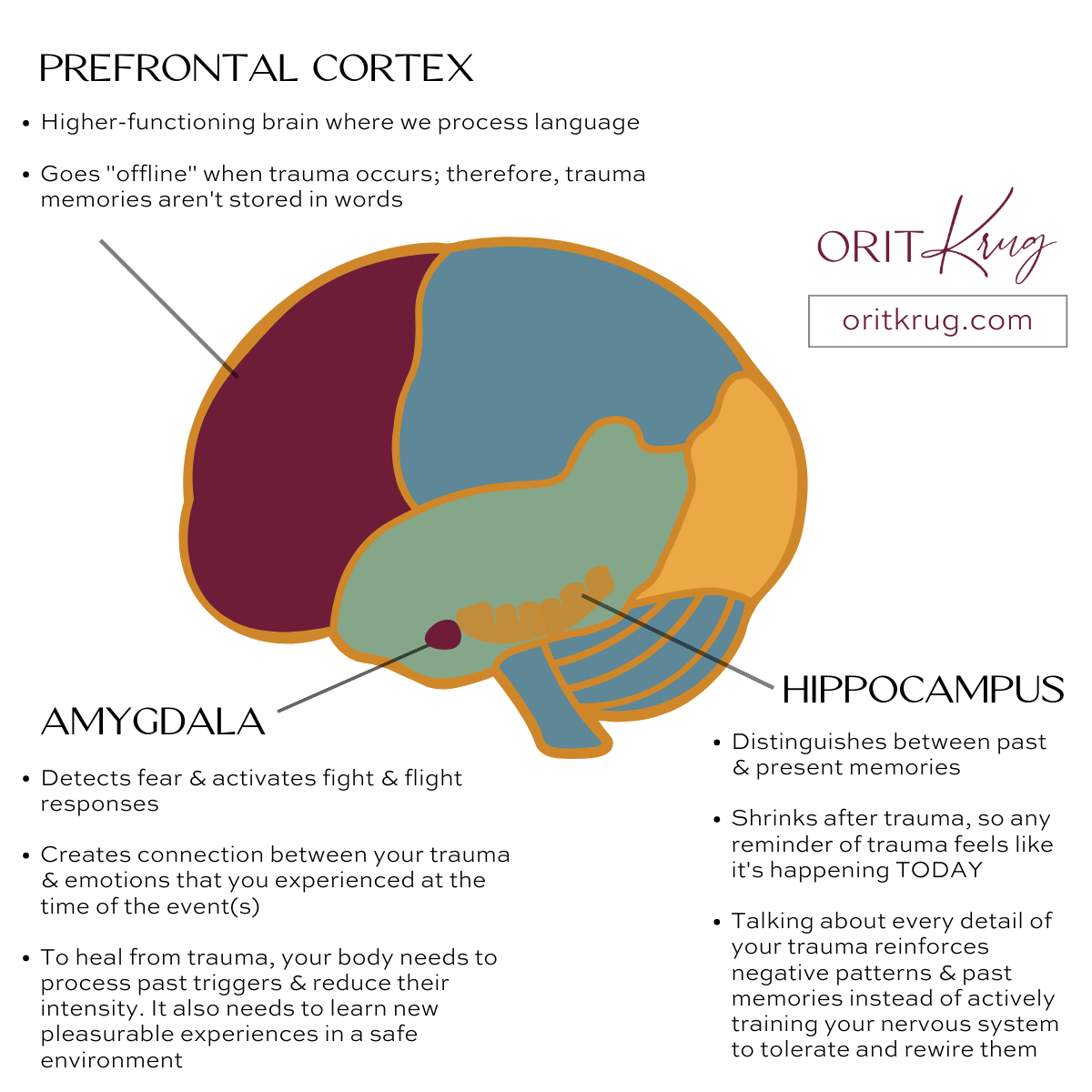Why jealousy in polyamory is difficult to navigate when you have past trauma
By Orit Krug | June 1st, 2023
Jealousy in polyamory may feel unbearable to those who have unresolved past trauma.
It’s highly common to experience jealousy in polyamory. You may feel anger, sadness, grief, insecurity, or out of control when you feel jealous. These feelings are normal for even the most healthy and healed individuals.
However, it is an indication of past unresolved trauma when your primary response to jealousy includes rage, uncontrollable and impulsive aggression, and extreme withdrawal or dissociation. These are trauma responses that hijack our nervous system into Fight, Flight, and Freeze behaviors.
Not sure what the difference is between a common, healthy emotion vs. a trauma response to jealousy? Let’s break it down further in the next section.
4 indicators that trauma is being triggered via jealousy in polyamory
We can use the following 4 nervous system survival responses as a guide to understand if your reactions to jealousy are “normal” or a trauma response.
1. Fight Response
In a triggered state, the Fight response is a sympathetic nervous system response that activates outwardly aggressive responses such as yelling, cursing, and physical acts of violence. If your entire body responds to jealousy with impulsive aggressive behaviors, then this is a sure sign that jealousy has triggered unresolved trauma causing you to react as if you have to fight off a predator.
This is not necessarily the same as feeling a healthy amount of anger in response to jealousy. Anger is a normal feeling that is important for all of us to feel as part of the full spectrum of human emotions. If you feel a healthy level of anger in response to jealousy, you may feel a heated energy through your body, or a desire to say hurtful things to your partners, but you don’t necessarily react to these feelings.
You may take time to feel these uncomfortable sensations in your body or hear the words you secretly wish to say out loud, but ultimately you know how to regulate and approach the situation with a calmer tone and energy. You may express your anger with vulnerability, softness, and assertiveness, but not impulsive aggression. That’s the difference.
2. Flight Response
In a triggered state, the Flight response is a sympathetic nervous system response that stimulates “running away” behaviors such as escaping the room, driving away in your car, and threatening to break up. If your entire body responds to jealousy by escaping the situation or relationship, then this is a strong indication that jealousy has triggered unresolved trauma causing you to react as if you have to run away from a predator.
There’s a difference between a Flight response and intentionally taking a break from a fight or situation in order to calm down. If you’re feeling overwhelmed with emotions due to jealousy, you may recognize in the moment that you need some time away from the conversation or interaction causing these uncomfortable sensations. You may say to your partner, “I think we should take a break. This is getting too heated. Can we resume when we’re both more calm?” This is an example of a regulated response with the ability to ask for what you need. If you can remain calm enough to ask for or assert your need for space, then this is a sign of a healthy nervous system not reacting impulsively to old trauma. However, if you impulsively leave the room or end the relationship, then this indicates a Flight response to jealousy.
3. Freeze Response
In a triggered state, the Freeze response is a parasympathetic nervous system response that may cause you to physically freeze up and temporarily lose your ability to respond in a situation. The freeze response is a more ancient nervous system response that is activated when there is a higher level of perceived fear. This response was useful for our ancestors. When our bodies tense up so tightly, we become unappetizing to eat in the eyes of potential predators. It’s not usually necessary considering that we humans are more civilized today, but it is a very useful self-protective mechanism when truly needed. Unfortunately, many people today still react with the Freeze response in response to relationship stressors, even though there’s no life-threatening danger.
With a Freeze response, you may react to jealousy with a sudden inability to speak up, or blankly stand there like a deer in the headlights. Your partner might pressure you to speak or become frustrated that you’re essentially non-responsive, which can exacerbate your freeze response.
The freeze response is different from allowing yourself to take a moment in the midst of feeling heated or jealous. You may say to your partner, “I’m overwhelmed with emotion right now. Can you give me a few minutes to breathe and think?” You may also say, “I don’t want to talk right now,” and remain quiet. These are both examples of healthy responses where you are choosing and communicating your desire to pause. However, if you uncontrollably check out and go blank during an interaction, that’s a strong indication of a freeze response to cope with jealousy.
4. Fawn Response
In a triggered state, the Fawn response is a parasympathetic nervous system response that causes you to abandon your needs for the sake of pleasing others. If you respond to jealousy by dropping all your boundaries and doing only what your partners want, then this is a strong indication that jealousy has triggered unresolved trauma causing you to protect someone else’s feelings above your own health and life.
With a Fawn response, you may react to jealousy by telling your partner that whatever they’re doing is okay even if it’s creating intense discomfort within your body. You may say “yes” to their requests even when you know you’re not okay with them. Essentially, you abandon what’s important and healthy for you in order to please them.
There’s a difference between a fawn response and compromising, or loosening a boundary that you previously held more tightly. If you’re navigating difficult emotions due to jealousy with your partner dating someone new, you might propose that they send you a few updates via text while they’re out. You may also experiment with having them not update you at all while you attempt to distract yourself with self-loving activities or hanging out with friends. If you are making intentional choices on shifting boundaries, then this is likely not a trauma response. But if you are making impulsive decisions without thinking twice or asserting your own needs, then it’s likely a fawn response.
Do you identify with any of these nervous system reactions to jealousy? Most people have one dominant nervous system response when old trauma is triggered, but it’s completely normal and common to experience a variety of responses depending on the situation and people involved.
How to deal with jealousy in polyamory when past trauma is triggered
Navigating jealousy is very difficult when you’re triggered because of the usual intensity and impulsivity associated with trauma-based reactions. Many people who get triggered with jealousy experience the same cycle of events. They react impulsively, eventually calm down, and later realize or regret that they already repeated the same unwanted pattern.
The reason why it’s often such a hard task to stop the reaction as it’s occurring is because our nervous systems hijack our body’s responses in order to protect us from danger or perceived death. While we may know in our mind that we won’t die or get physically hurt due to our partners falling in love with someone else or having sex new partners, our nervous system and primal brain automatically react as if we will.
This is usually because these situations trigger trauma memories that remind us of highly painful abandonment, rejection, or manipulation from people who hurt us in the past. The mind can try to tell us all day that we are safe, and that jealousy is normal, but until the trauma is processed from our nervous system and body, it will continue to react impulsively no matter what the mind says.
The following infographic shows us why talking ourselves through trauma triggers isn’t enough to change them:

Here are a few steps to begin navigating jealousy in a healthier way, even when old trauma is being triggered:
- Identify the nervous system responses that typically get triggered when you feel jealous (Fight, Flight, Freeze, or Fawn).
- Notice what sensations arise in your body through each response. Do you feel a heated energy running through your body as the Fight response is triggered? Do you lose touch with your physical surroundings during Freeze? Once you notice the patterns of sensations, you have the awareness to begin changing them.
- Visualize what these sensations look or feel like in your body. You can identify the speed, texture, color, size, etc. When you begin to feel any of these sensations arise through jealousy, see if you can shift any of the sensation’s attributes (i.e., shifting from fast to slow). This is another way of gaining command over the emotion arising in your body instead of it hijacking and controlling you.
Try this exercise alone every day for 5 minutes, for at least a week. See if it changes the way you respond in real time in different relationships and situations. It can be immensely helpful!
If you find that you’re still repeating the same unhealthy reactions, then it’s important to seek professional support with a therapist who can help you safely and effectively access and release trauma from your body, so that you can respond in a much healthier way.
Join our somatic retreat for polyamorous folks navigating trauma
The latest trauma research consistently shows that trauma gets stored in the non-verbal parts of our brain and body. If you’ve been in therapy or seeking support for a while, but you still feel that trauma is hijacking your nervous system & body’s responses, this is NOT your fault. A somatic, embodied approach is necessary to process & release trauma. Talking can only get us so far.
I am co-facilitating a Poly Retreat with Dedeker Winston (co-host of Multiamory Podcast), where we will be using somatic therapy practices to help you integrate and embody the ability to deeply love yourself and your partners through your poly journey. Our neuroscience-backed practices are effective in processing traumas, working through current non-monogamy challenges, and deeply celebrating your incredible & courageous journey of practicing open love!
Click here to learn more about our next Poly Somatic Healing Retreat!
